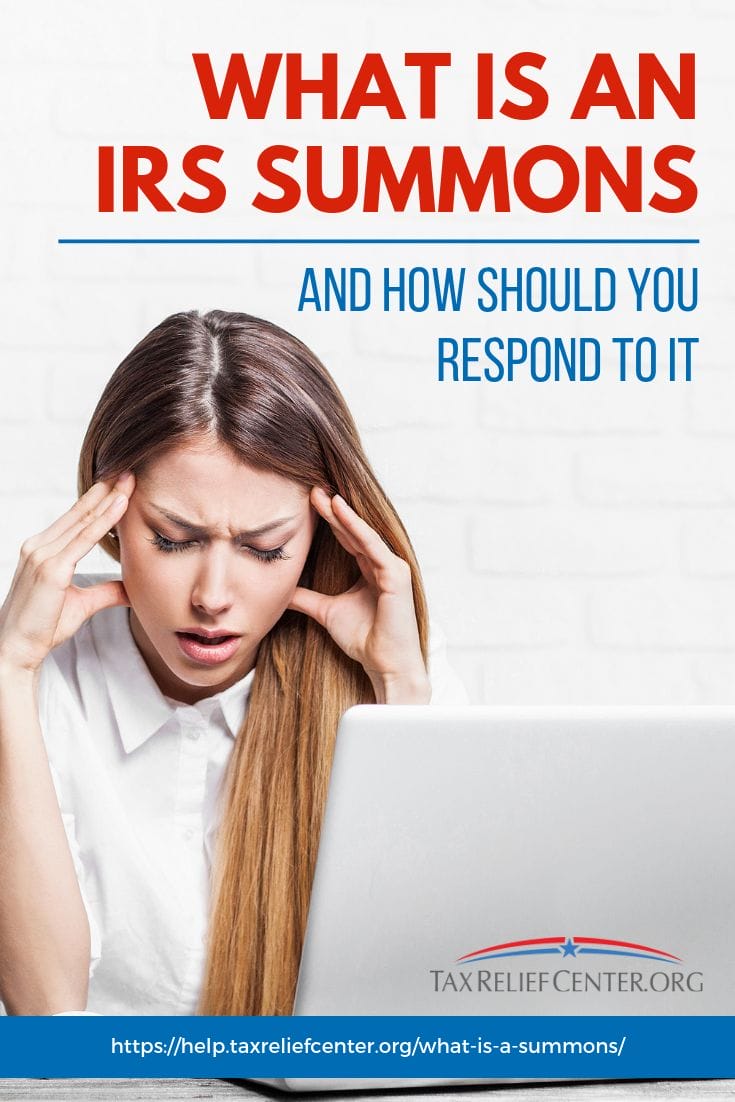You should not wonder or panic when asking “what is a summons?” should you receive this notice from the IRS. Responding to one is easier than it seems.
RELATED: How To Avoid Taxes Through The Mortgage Forgiveness Debt Relief Act
In this article:
- What Is an IRS Summons?
- Why Is the IRS Sending Me a Summons?
- What Should a Taxpayer Know About an IRS Subpoena?
- How Should I Respond to a Summons from the IRS?
What Is a Summons? And Other Frequently Asked Questions
What Is an IRS Summons?
First off, a taxpayer should know what an IRS summons is NOT. Here are a few clarifications:
- It is not the same as the usual court summons with a judge or a jury.
- The tax court is (usually) not involved yet.
- Most of the proceeding is administrative in nature, rather than through judicial means.
- Sometimes, the process goes through correspondence with an IRS officer rather than through a full-blown trial.
- Most of the resulting action when an IRS summons prospers is civil in nature rather than criminal. However, some instances can lead to criminal charges like tax fraud, and proceeds through the local court or the tax court depending on the crime.
Technically speaking, an IRS summons is a form that the IRS sends to a taxpayer to request the attention and presence of the individual regarding an important tax matter.
A taxpayer can immediately find out if the tax concerns criminal law if:
- There is a designated case number found in Form 4564;
- The body of the summons contains the case name, usually phrased as the name of the plaintiff (in this case the IRS), and the defendant, usually the taxpayer;
- It is specified which court carries the jurisdiction to hear the case; and lastly,
- It mentions the number of days the recipient of the form has to confirm or deny his or her presence in the case.
Even if you are simply a third party, like a witness to the alleged tax fraud or a colleague of a freelancer who is supposedly misclassified as an employee, a taxpayer should always answer if the IRS sends a summons.
For those who want to see an example of an IRS summons, a taxpayer can look at a sample New York IRS Summons Form 2039.
This form follows after at least one request from the IRS for more information. Specifically, IRS Summons Form 2039, which is what most taxpayers know as the IRS summons, must be preceded by at least one IDR (Information Document Request).
The most common IDR is the IRS Form 4564. This general form requests information from the taxpayer about any matter, and taxpayers can usually see a Form 4564 during tax audits.
Lastly, even if the IRS made a procedural error, such as a typo in the letter or sending the letter too early in the tax audit process, the issuance of the proper Form 2039 rectifies those previous mistakes.
Why Is the IRS Sending Me a Summons?

Just to be perfectly clear, anyone can receive an IRS summons.
The guiding principle for an IRS summons is this: if the IRS has sent an IDR, Information Document Request, and you have not replied, then the IRS has the power to compel the taxpayer to release information.
However, the IRS still has to prove that a taxpayer’s response, or at least the information requested, is essential to the tax concern.
Most of the times, a taxpayer receives the summons due to a/an:
- IRS audit wherein he or she plays an important part;
- Serious actionable concern, like being part of an employee misclassification situation;
- Essential assistance in tax collection methods, like an IRS levy or confirmation for the nature of an asset, wherein an individual’s knowledge can help.
The list above is not exhaustive, as the IRS can ask anyone to appear during an audit or else face consequences.
Important note: the taxpayer should appear personally if the IRS requests their presence. A representative with a Power of Attorney will not have legal standing unless 1) the POA is the counsel and 2) the taxpayer has a valid reason for his or her absence.
RELATED: What Is The IRS Negligence Penalty?
What Should a Taxpayer Know About an IRS Subpoena?
A subpoena is an order by a government agency to either require the presence of an individual or to provide any evidence needed in a proceeding. Generally issued by a court to compel the presence of individuals, a subpoena has very stringent procedural requirements, where a flaw can invalidate the whole process.
However, the IRS has special subpoena power. The law considers the IRS summons an administrative, rather than a judicial, subpoena. This means more lenient requirements, as well as the possibility of retroactive validity if the agency rectifies the procedural process.
A valid IRS summons or subpoena must be:
- Served to the appropriate individual in a proper manner. The law considers an IRS subpoena properly delivered if sent to the mailing address.
- An IRS officer signs the IRS Form 2039.
- The information or presence that the IRS asks for is specific. Vague conditions can make the whole process not only procedurally invalid but also confusing.
- A reasonable venue and schedule are specified in the form.
Again, even if the IRS made a mistake in the process, they can easily rectify it by sending another form.
Lastly, an IRS subpoena or summons, in order to be enforceable and valid, should:
- State what information the IRS is looking for;
- Reiterate that the IRS summons is for a legitimate purpose without any bad faith;
- State that the IRS does not have the information already in their possession; and
- Conform to the Administrative Steps by the United States Code. Usually, this means that the IRS should provide the taxpayer at least a 30-day window for the reply.
In a sense, an IRS subpoena and summons perform the same function. They both refer to the IRS Form 2039 to compel presence or information from individuals.
However, if the tax concern pertains to a possible criminal case, rather than a civil case, a tax specialist will most likely call the IRS Form 2039 a subpoena instead of a summons. Remember, the court can charge taxpayers in contempt of court if they do not comply.
How Should I Respond to a Summons from the IRS?

First, the taxpayer should know their rights. Some important privileges that taxpayers may forget are:
- Third party individuals can refuse unreasonable requests;
- The right to be represented by informed counsel;
- Privileges to secret communication for husband and wife, clergy to penitent and lawyer to client;
- Ability to procure an audio recording of the IRS audit or proceeding; and
- The right to raise valid defenses against any accusations.
A taxpayer can prevent going through an IRS summons by:
- Answering any IDR, usually Form 4564, as soon as possible.
- Upon receipt of a summons, raise any legal right or privilege immediately. For example, a wife can raise the privilege of spousal relationship to avoid going through the audit.
- Raise that information or presence is not relevant to the IRS.
As Form 2039 functions both as a notice of summons and as attestation, so a taxpayer should answer the form. Usually, taxpayers only need to attest or sign the form to confirm receipt and understanding, or face the consequences of ignoring the IRS.
Taxpayers wondering what is a summons can rest easy, as an IRS summons exists to find out the truth, not to waste the time of taxpayers. By answering the summons as early and as honestly as possible, future stress can be avoided.
What do you think about the IRS summons process? Do you have other opinions and stories about going through one? Let us discuss in the comments section below.
If you owe back taxes, visit taxreliefcenter.org for more information on tax relief options.
Up Next:
- Tax Penalty For Underpayment [2019 Edition] | Tax Relief Center
- Business Vs Hobby: How The IRS Qualifies Hobby Income As A Business
- Personal Income Tax | A Guide To Doing Your Taxes


